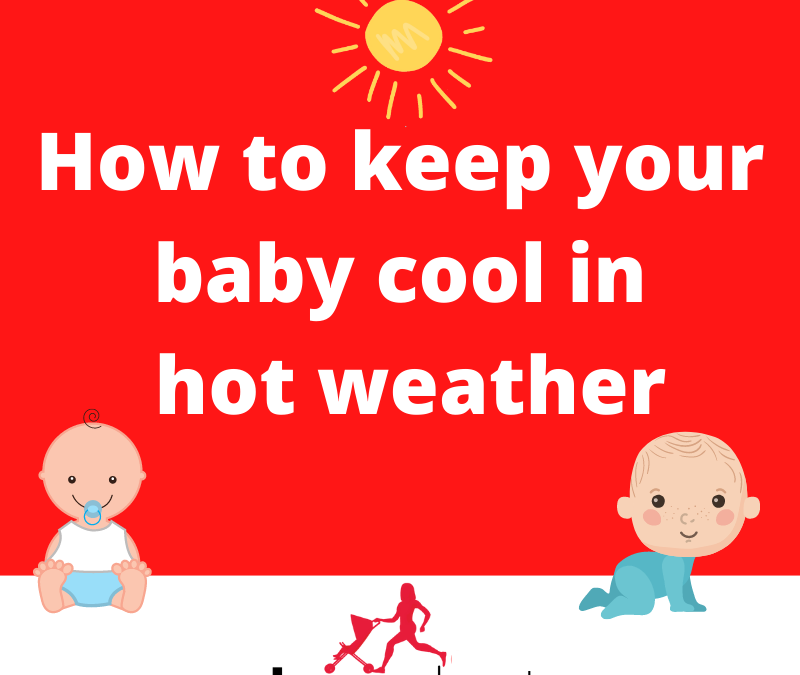If you are out and about in high temperatures, make sure that your baby is kept in the shade to avoid them overheating. Using a parasol on your pushchair can help keep them shaded. Never cover your child’s car seat, pushchair or pram with a blanket to keep them cool.
Our Buggy Beat classes always offer shadey areas to workout so you never have to worry about your baby overheating or YOU in this heatwave!
Worried your baby is overheating? Here are the signs:
- feels hot (with or without a fever).
- looks flushed or red.
- is sweating or has damp hair (though keep in mind that babies can be overheated without sweating)
- acts fussy or restless.
- has an elevated heart rate (tachycardia)
- seems overly tired, sluggish, or listless.
Here are the NHS suggestions:
Keep your baby cool and protect them from the sun.
- Babies less than 6 months old should be kept out of direct sunlight. Their skin contains too little melanin, which is the pigment that gives skin, hair and eyes their colour, and provides some protection from the sun.
- Older babies should also be kept out of the sun as much as possible, particularly in the summer and between 11am and 3pm, when the sun is at its strongest. If you go out when it’s hot, attach a parasol or sunshade to your baby’s pushchair to keep them out of direct sunlight.
- Apply a sunscreen with a sun protection factor (SPF) of at least 30 to your baby’s skin. Make sure the product also protects against both UVA and UVB rays. Many brands produce sunscreen specifically for babies and young children, as these products are less likely to contain additives that might irritate the skin. Apply the suncream regularly, particularly if your child is in and out of the sea or paddling pool.
- Make sure your child wears a sunhat with a wide brim or a long flap at the back to protect their head and neck from the sun.
Avoid dehydration
Like adults, babies and young children need to drink plenty of fluids to avoid becoming dehydrated.
From 0 to 6 months
- Fully breastfed babies do not need any water until they’ve started eating solid foods. During hot weather they may want to breastfeed more than usual.
- If you’re bottle feeding, as well as their usual milk feeds, you can give your baby a little cooled boiled water. If your baby wakes at night, they’ll probably want milk. If they have had their usual milk feeds, try cooled boiled water as well.
- Remember you can ask your health visitor or another health professional for advice about any baby care issue, advice will then be tailored to meet your baby’s needs.
From around 6 months
- Once you have started to introduce solid foods, you should offer your baby sips of water from a cup or beaker with meals. Remember that breastmilk or infant formula should be their main drinks during the first year. In hot weather, you may need to offer some additional water outside of mealtimes.
From 12 months
- Water, breast milk or whole cows’ milk should be your baby’s main drinks. In hot weather, you can try giving them frozen lollies made from plain water or from very diluted fruit juice to help keep them hydrated. Lollies made from diluted fruit juice should only be given at mealtimes because they can cause tooth decay.
- For older children, give them plenty of fruit and salad to help keep their fluid levels up. Remember that undiluted fruit juice or smoothies should not be given to children until they are 5 years old, as these can also cause tooth decay.
Keeping cool
Follow these tips to help keep your children cool and safe during hot weather.
- Playing in a paddling pool is a good way of keeping babies and children cool. Keep the pool in the shade during very hot weather and supervise the children carefully at all times.
- Run them a cool bath before bedtime.
- Keep your child’s bedroom cool during the day by closing blinds or curtains. You can also use a fan to circulate the air in the room.
- Keep nightwear and bedclothes to a minimum. If your baby kicks or pushes off the covers during the night, consider putting them in just a nappy with a single well-secured sheet that will not work loose and cover their face or get entangled during the night.
- A nursery thermometer will help you monitor the temperature of your baby’s room. Your baby will sleep most comfortably when their room is between 16C and 20C.

